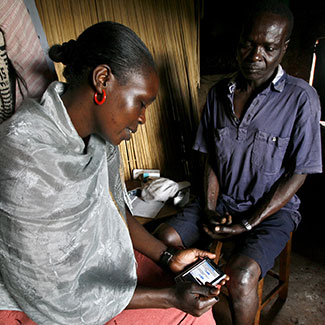Innovative mobile health projects in LMICs receive $5M from Fogarty and NIH partners
September / October 2019 | Volume 18, Number 5

Photo by Dr. Bill Tierney
Fogarty’s mobile health research program aims to catalyze
innovation in low- and middle-income countries by supporting
multidisciplinary projects using wireless devices to improve
health.
Fogarty and its partners from across NIH plan to award $5 million over two years to support innovative exploratory and developmental mobile health research in low- and middle-income countries (LMICs). The 13 new awards are made through Fogarty’s
Mobile Health: Technology and Outcomes in Low and Middle Income Countries program, which aims to catalyze innovation through multidisciplinary research, while strengthening LMIC mHealth capacity. Recipients will use mobile and wireless devices such as smartphones and tablets to improve health outcomes, health care services and health research.
A majority of the awards will support projects in sub-Saharan Africa, with many related to the diagnosis and treatment of infectious diseases. Researchers with the Boston University Medical Campus will focus on screening children for pneumonia in Zambia, comparing traditional x-rays to cellphones with ultrasound transponders. Tulane University scientists will develop a cellphone microscope platform to rapidly screen children in Kenya for tuberculosis, while making improvements to the storage and transport of screening materials. University of Georgia investigators will adapt video directly observed therapy in Uganda to improve tuberculosis treatment adherence, leveraging input on perceived barriers from patients and providers.
In the area of injury research, University of Texas Southwestern Medical Center will build mobile tools to report road traffic injuries in Nigeria, with the goals of reducing transport time for victims and improving information provided to first-responders.
A number of projects in the sub-Saharan African region will focus on improving health outcomes for people with noncommunicable diseases. The Sloan Kettering Institute will train radiologists in Nigeria to perform mobile ultrasound-guided breast biopsies, building capacity for point-of-care breast cancer diagnosis. Through an existing partnership in Lesotho, another team from Boston University Medical Campus will adapt an animated online tool that identifies and mitigates health risks for women before pregnancy. In Kenya, researchers with Michigan State University will bring together public health professionals and software developers to create a mobile application to help adolescents manage Type 1 diabetes. To improve self-care for heart failure patients in Uganda, scientists with Yale University will implement a scalable, locally relevant patient application that runs on low-cost feature phones, with an associated dashboard for clinicians.
Projects throughout Asia will also explore ways to leverage mobile health to treat chronic diseases. Rutgers Biomedical and Health Sciences School of Health Professions will create a smartphone app for self-management of gestational diabetes in Nepal, while helping deliver relevant information to clinicians. Also in Nepal, researchers with the University of California San Francisco will develop a mobile application to provide ongoing training to community health workers to improve depression treatment.
In Thailand, investigators with Massachusetts General Hospital will enhance a smartphone application for homebased monitoring of patients with chronic kidney diseases, comparing patient outcomes to those of patients using handwritten logs. An interdisciplinary team of U.S. and Chinese investigators led by the University of Pennsylvania will use a smartphone platform and app to detect specific cancer types from biopsies and transmit data to doctors, health records systems and surveillance teams to improve cancer therapy in low-resource areas.
In the Dominican Republic, researchers with Northern Illinois University will measure the effectiveness of a mobile application that delivers mental health treatment provided by community health workers.
Fogarty’s mHealth program, which has funded more than 60 projects since it launched in 2014, has attracted interest from Institutes and Centers across NIH. Support for the current awards was provided by the National Cancer Institute (NCI), National Institute of Biomedical Imaging and Bioengineering (NIBIB), National Institute of Mental Health (NIMH) and NIH Office of Behavioral and Social Sciences Research (OBSSR). Other NIH partners for the program include the Eunice Kennedy Shriver National Institute of Child Health and Human Development (NICHD), National Institute on Deafness and Other Communication Disorders (NIDCD), National Institute of Neurological Disorders and Stroke (NINDS) and NIH Office of Research on Women's Health (ORWH).
Initially the program used the R21 mechanism for exploratory and developmental research with up to two years of funding. The
most recent funding announcement, which uses a phased innovation approach that provides two to five years of support, has multiple upcoming deadlines: AIDS-related grant applications are due December 3, 2019 and December 3, 2020; and all other grant applications are due November 19, 2019 and September 24, 2020.
2019 Awards for Mobile Health: Technology and Outcomes in LMICs
More Information
To view Adobe PDF files,
download current, free accessible plug-ins from Adobe's website.